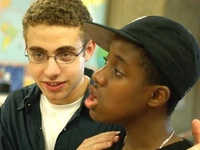“Exponential growth,” cries one student.
Another twitches excitedly in his chair, then blurts out his realization that the number one raised to any positive power is equal to itself. He slams his hand on his desk.
“I rest my case,” he says, and nods briskly.
During the second half of the class, Billings leads his students to a ten-foot strip of paper extending across the floor. Together—some students making calculations on the boards, others measuring lengths on the paper—the students transform the strip into a line of numbers and their squares. They will have to raise points on the number line to their third and fourth powers for homework.
Billings shows his students how to use the line to estimate unknown square roots as a handheld bell rattles through the hallway, heralding the beginning of the 50-minute lunch period.
Students crowd around the lunch tables, usually joined by one or two teachers. The student-to-faculty ratio at Summerbridge is a little over two to one, and each teacher serves as an adviser to two students.
“Attitude check!” one of the teachers cries. A rhythm beat on the tabletops begins immediately and grows as more students join. When it ceases, the room is quiet.
But only for an instant. Soon, the “Mission: Impossible” theme cleaves the silence once more and the two black-clad figures who appeared earlier begin throwing toilet-paper streamers from the balcony.
Public Purpose
When the diversion ends, students and their teachers return to the meal before them: sandwiches, apples and juice—a unenticing combination they know as “federal food” because the program receives the meals gratis from the federal government.
The program receives about 10 percent of its funding from the government and 60 percent from foundations. The remaining funding comes mainly from corporations and private donors.
This summer, Harvard donated two apartments in Peabody Terrace to provide lodging for student teachers visiting Cambridge from outside the area.
Two alums of the College, Angela L. Duckworth ’92 and Philip King ’92, founded Summerbridge Cambridge in 1992 to bring the Summerbridge programs that existed elsewhere in the nation to Cambridge.
But from the start, Summerbridge Cambridge was different from many of its peer programs, says Executive Director Sheilah Kavaney.
Rather than serving the population of private schools, as most comparable programs had done, Summerbridge Cambridge targeted students in Cambridge public schools.
Read more in News
College Dems Rally For Kerry














